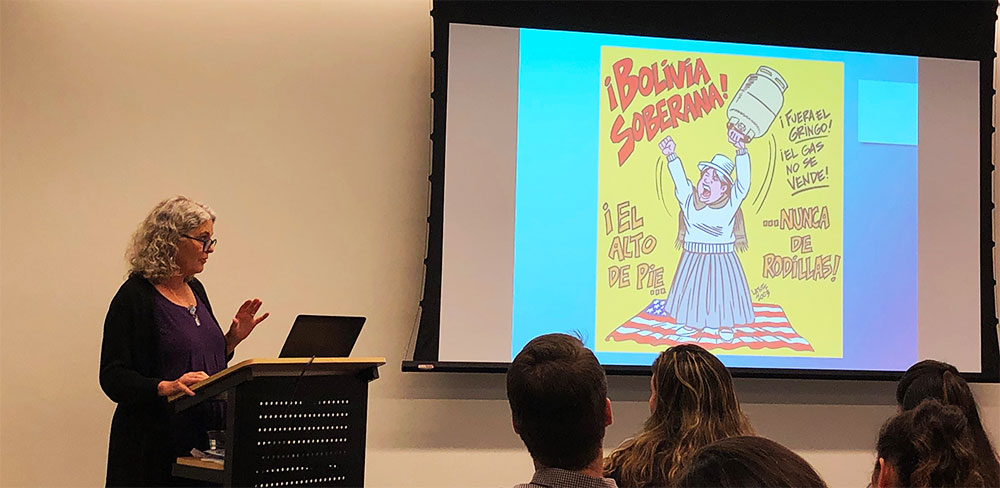 UF Center for Latin American Studies
UF Center for Latin American Studies
Book talk with Dr. Nancy Postero, UC San Diego (Anthropology)

March 13, 2019 - William Boose
On February 13, Professor Nancy Postero, University of California San Diego Department of Anthropology, presented her recent book The Indigenous State: Race, Politics, and Performance in Plurinational Bolivia to students and faculty from the Center for Latin American Studies, the Department of Anthropology, and the wider University of Florida community. Over fifty attendees crowded into the Multicultural and Diversity Affairs meeting room in the Reitz Union to hear Postero discuss the discourses, policies, and practices of the Evo Morales government and her analysis on how indigenous ideas and values were taken up by the state. Following an introduction by Dr. Joel Correia and a warm welcome from those in attendance, Postero began by stating “today I am going to tell you about the fascinating economic and political project underway in Bolivia.”
Professor Postero identified two big tensions in the case of Bolivia’s indigenous political project: decolonization and resource struggles. Postero drew from the popular Marvel movie Black Panther, and scholars such as Frantz Fanon and Ranajit Guha to frame Bolivia’s struggle for decolonization in an accessible and thought-provoking way. She discussed positive developments that include the centering of indigenous peoples who had previously been marginalized in Bolivia and the establishment of a Vice Ministry of Decolonization. She also problematized the idea of decolonization in Bolivia by discussing state repression under the Morales administration in the TIPNIS case, and the sometimes contradictory relationship between the Morales administration and Bolivia’s indigenous peoples. She concluded her talk by claiming that the project of the so-called indigenous state in Bolivia has gone from indigeneity and decolonization as a site of emancipatory politics to decolonization as a tool of policing, accompanied by the discourse of “economic liberation.” This analytical framework proves useful in tracking the progression of Evo Morales’ government from election through present day.
Professor Postero transitioned to the Q+A session with a question of her own: “can decolonization be a tool for social change?” Roughly twenty attendees stayed to engage in dialogue, and their attitudes on this question—although varied—seemed to lean towards an optimistic “yes.” This included some perspectives that recognized limitations and errors in the Morales government but also sought to highlight its achievements and progress towards centering previously oppressed peoples in Bolivia. Student and faculty questions explored themes of Bolivian economics (i.e. “is Bolivia socialist?”), gender in the Bolivian government and indigenous social movements, the upcoming presidential elections in Bolivia, and reflections on where we all fit into these issues. Postero stayed for half an hour after her presentation to engage in conversation around these themes.
This book talk was organized by Center for Latin American Studies faculty member Dr. Joel Correia, to inaugurate the MALAS Indigenous Studies speaker series. The Center thanks Professor Postero for her visit and engaging book talk.